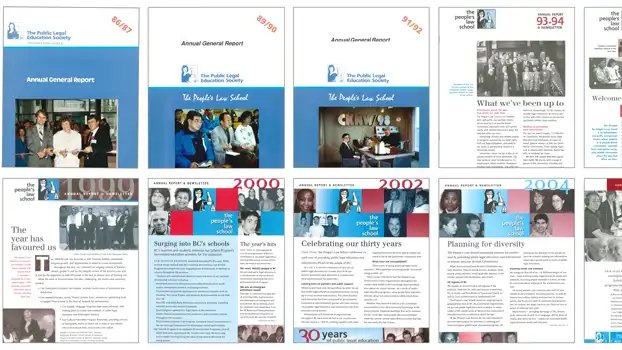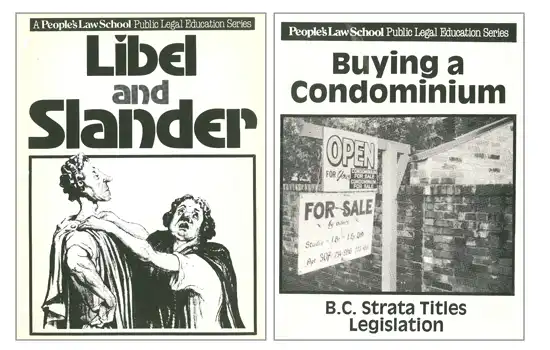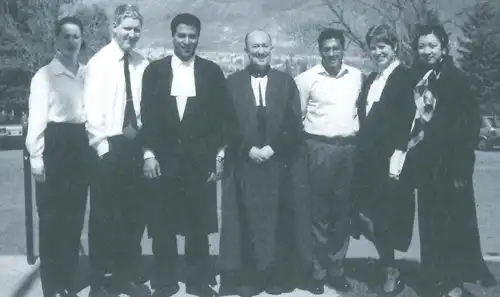History

In 1972, several UBC law students organized free law classes for the public, hosting them at the Vancouver home of one of the students, Diana Davidson. Supported by a federal government grant, the students held 35 classes, taught by volunteer lawyers and law professors. Over 3,500 people attended. The People's Law School was born.
Pioneers in public legal education
Buoyed by the success of these first law classes, we sought ongoing funding from the Law Foundation of BC, the Legal Services Society, and the federal Department of Justice. This funding allowed us to operate on a more permanent basis and hire our first executive director, Patti Pearcey. In 1974, we became a registered society under BC law under our first name, the Vancouver People’s Law School.
With this step, we became the first organization in Canada dedicated exclusively to educating the public about the law.
Over the following years, we pioneered many programs later offered by other public legal education organizations across Canada. Starting in 1974, we began to publish and distribute legal information booklets. The next year we began producing videos on everyday legal issues. The same year we recognized the need to provide public legal education to Vancouver’s rapidly-growing immigrant communities, and started delivering classes in Cantonese and Punjabi.
By 1982, we were organizing free law classes in more than 75 communities throughout British Columbia, publishing 16 easy-to-read booklets, producing videos for classrooms and community cable networks, and publishing articles in 60 community newspapers.

Expanding and evolving
In the mid-1980s, Gordon Hardy took over as our Executive Director, and led the organization for two and a half decades until he retired in 2010.
During this time, People's Law School continued to expand and evolve. In 1987, we moved into new premises at 900 Howe Street that included a classroom and a boardroom. Up until that time, we had operated out of a succession of small offices that did not allow us to host programs for the public at our premises.
In the mid-1980s, with support from the federal Department of Justice, we introduced another innovation: using live theatre performances to deliver public legal education. We performed a series of mock trials on impaired driving and shoplifting at the Pacific National Exhibition (PNE), the annual summer fair held in Vancouver. The performances were enjoyed by 10,000 fair-goers, and 1,000 served as jurors, deciding the guilt or innocence of the accused person. This interactive approach proved to be hugely popular: Justice Theatre continued to perform every summer at the PNE until 2000.
Beginning in 1997, we started taking the Justice Theatre into school settings. Over the following 20 years, until 2018, Justice Theatre was performed in hundreds of schools throughout British Columbia. Theatrical performances portraying trials on topics such as online bullying, street racing, hate crimes, and youth gangs introduced the law in action to thousands of youth across the province.
Our late colleague and friend, Rob McAninch, founded Justice Theatre and for over 30 years was its coordinator and champion. Upon Rob's passing in 2018, we suspended the program, to take time to review our strategic priorities as an organization and Justice Theatre’s alignment with these priorities. On completing the review and developing new strategic priorities, we concluded that the Society’s efforts for 2020 and beyond should be re-balanced to emphasize digital resources for the public on everyday legal problems. The Covid-19 pandemic in 2020 reinforced this assessment, sparking a need for accessible legal information on pandemic-related issues affecting so many British Columbians. Accordingly, we decided not to revive Justice Theatre. The program nonetheless remains a vital piece of our evolution as an organization dedicated to innovation in programming and interaction with our audiences.

Continuing to innovate
The 2000s ushered in profound changes in how people accessed information. People no longer needed to seek out inperson learning opportunities; they could find information on the internet. Attendance at People's Law School classes started to drop.
So we shifted our focus. Having launched our first website in 1997, we launched a new and improved site in 2005 featuring PDF versions of all of our booklets. In 2010, we teamed up with Courthouse Libraries BC to pilot a new approach to putting our booklets online. We converted A Death in Your Family into a Clicklaw Wikibook, a collaborative site powered by wiki technology. As compared to a PDF document, the wikibook offered an easier on screen reading experience and could be found in searches more easily. As well, the wikibook enabled a downloadable ebook format, a mobile version, and a print-on-demand option to be offered with no additional effort.
The wikibook pilot was a distinct success. Within the first year, the wikibook was being accessed over twice as frequently as the PDF version of the booklet. By 2016, we had converted 15 of our booklets into wikibooks, and our Clicklaw Wikibooks were attracting over 40,000 visits annually.
In 2017, we launched our fourth generation website, featuring content we developed specifically for the web. The content features interactive elements, step-by-step guidance, and practical tools such as downloadable templates. We sharpened our focus on everyday legal problems — issues that come up fairly often in daily life for a significant number of British Columbians.
In 2019, we added Dial-A-Law to the fold, taking over operation of the site from the Canadian Bar Association BC Branch. As a starting point for information on the law in British Columbia in 190+ topic areas, it complements the in-depth coverage of everyday legal problems on our People's Law School site.
A leader in public legal education
By 2020, traffic to our People's Law School site had increased tenfold since the 2017 relaunch. Visitors were giving glowing reviews for how the information helped them take action to "work out life's legal problems."
As the coronavirus pandemic took hold in early 2020, we adapted on the fly and started offering webinars. They allowed us to reach British Columbians across the province, remotely, with up-to-date education on their rights during the crisis.
Webinars are now a key part of our programming mix. We reach hundreds of viewers with each of our broadcasts, which we record and make available through our website.
Also in 2020, we led a collaborative initiative with other public legal educators in British Columbia to introduce best practices for better legal information. They help us and others produce information our audiences trust, understand and use.
